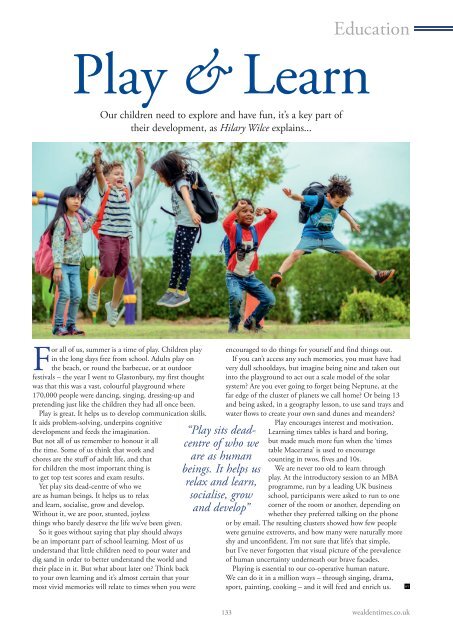Wealden Times | WT210 | August 2019 | Restoration & New Build supplement inside
Wealden Times - The lifestyle magazine for the Weald
Wealden Times - The lifestyle magazine for the Weald
You also want an ePaper? Increase the reach of your titles
YUMPU automatically turns print PDFs into web optimized ePapers that Google loves.
Play & Learn<br />
Education<br />
Our children need to explore and have fun, it’s a key part of<br />
their development, as Hilary Wilce explains...<br />
For all of us, summer is a time of play. Children play<br />
in the long days free from school. Adults play on<br />
the beach, or round the barbecue, or at outdoor<br />
festivals – the year I went to Glastonbury, my first thought<br />
was that this was a vast, colourful playground where<br />
170,000 people were dancing, singing, dressing-up and<br />
pretending just like the children they had all once been.<br />
Play is great. It helps us to develop communication skills.<br />
It aids problem-solving, underpins cognitive<br />
development and feeds the imagination.<br />
But not all of us remember to honour it all<br />
the time. Some of us think that work and<br />
chores are the stuff of adult life, and that<br />
for children the most important thing is<br />
to get top test scores and exam results.<br />
Yet play sits dead-centre of who we<br />
are as human beings. It helps us to relax<br />
and learn, socialise, grow and develop.<br />
Without it, we are poor, stunted, joyless<br />
things who barely deserve the life we’ve been given.<br />
So it goes without saying that play should always<br />
be an important part of school learning. Most of us<br />
understand that little children need to pour water and<br />
dig sand in order to better understand the world and<br />
their place in it. But what about later on? Think back<br />
to your own learning and it’s almost certain that your<br />
most vivid memories will relate to times when you were<br />
“Play sits deadcentre<br />
of who we<br />
are as human<br />
beings. It helps us<br />
relax and learn,<br />
socialise, grow<br />
and develop”<br />
encouraged to do things for yourself and find things out.<br />
If you can’t access any such memories, you must have had<br />
very dull schooldays, but imagine being nine and taken out<br />
into the playground to act out a scale model of the solar<br />
system? Are you ever going to forget being Neptune, at the<br />
far edge of the cluster of planets we call home? Or being 13<br />
and being asked, in a geography lesson, to use sand trays and<br />
water flows to create your own sand dunes and meanders?<br />
Play encourages interest and motivation.<br />
Learning times tables is hard and boring,<br />
but made much more fun when the ‘times<br />
table Macerana’ is used to encourage<br />
counting in twos, fives and 10s.<br />
We are never too old to learn through<br />
play. At the introductory session to an MBA<br />
programme, run by a leading UK business<br />
school, participants were asked to run to one<br />
corner of the room or another, depending on<br />
whether they preferred talking on the phone<br />
or by email. The resulting clusters showed how few people<br />
were genuine extroverts, and how many were naturally more<br />
shy and unconfident. I’m not sure that life’s that simple,<br />
but I’ve never forgotten that visual picture of the prevalence<br />
of human uncertainty underneath our brave facades.<br />
Playing is essential to our co-operative human nature.<br />
We can do it in a million ways – through singing, drama,<br />
sport, painting, cooking – and it will feed and enrich us.<br />
133 wealdentimes.co.uk


















